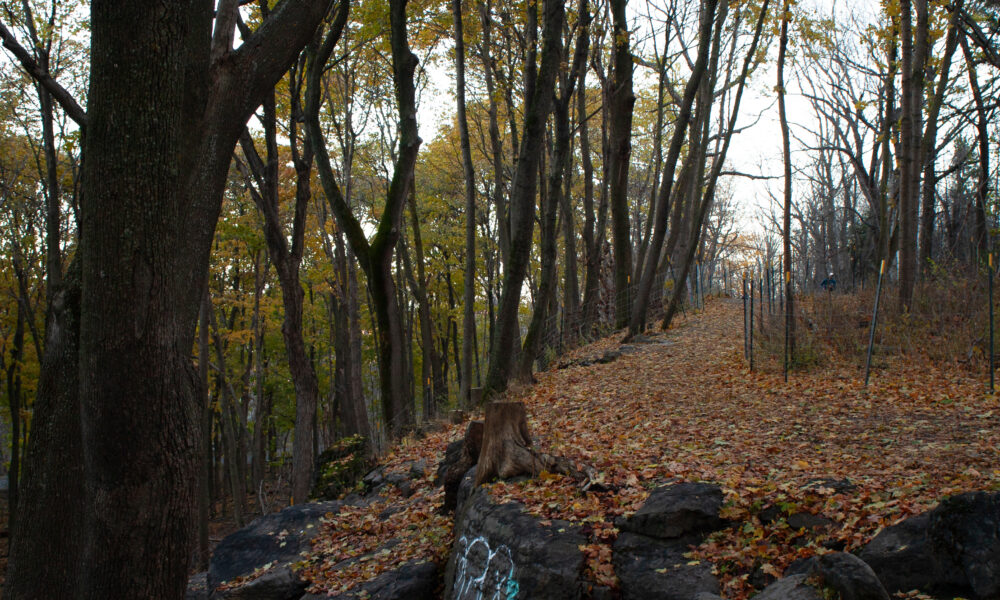There is no doubt that there is increasing urgency to address environmental challenges around the world. On Nov. 15th, the McGill Environment Student Society (MESS) hosted a lecture on climate change, with a focus on how an uncertain climate future brings about increased anxiety. Featuring Jen Gobby, an affiliate assistant professor at Concordia University in the Department of Geography, Planning and Environment, this event marked the inaugural session of MESS’ “Meet the Faculty” seminar series.
“One story we hear over and over again—in classes, on the news—is climate change as a crisis,” Gobby said in her talk. “And it is. It’s an ecological crisis. It’s a social crisis. It’s an inequality crisis. It is a crisis.”
Under these conditions, undergraduate students not only navigate their degrees, but also grapple with social issues, including climate change. Gobby’s recollection of her personal struggles resonated with the audience, which was filled with Bieler School of Environment students. Research increasingly shows that climate anxiety and eco-grief are significant psychological effects of this ongoing problem. In her talk, Gobby attempted to outline ways in which we can regain individual power to combat these negative emotions.
“Our emotions are a sign of our deep care of each other, of this earth, of the land we’re on, our own futures, of our families,” Gobby said.
Emotions are the fundamental driving force towards achieving climate justice, but they are not easily accessible for all. For some, they are empowering, while for others, emotions make political engagement all the more challenging. Gobby discussed how difficult it can be to debate about topics that resonate closely to you. She proposed that this contributes to why we see so much climate denial right now.
“It can actually lead us to repress their feelings or fully disengage, or even deny climate change.”
To remain active in the fight against climate change and to avoid despair, Gobby argued that we need to implement self-care strategies to ensure healthy coping mechanisms. Maintaining this commitment to action while looking out for your mental health is a serious challenge, though outlining this process can go a long way. These mechanisms are what suit you—it can be as simple as listening to a meditation podcast, reading a new novel you have been wanting to read, or doing community work.
“One of the things that has helped me address my climate [anxiety], and other kinds of anxieties and stresses, is being part of climate movements,” Gobby said.
At this point in the talk, Gobby opened the floor for students and faculty alike to share their own insights in regards to activism. Some mentioned Divest McGill’s initiatives, Indigenous rights movements, and youth climate marches across Canada. The discussion highlighted that advocacy comes in many different forms, including science communication, various art media, and on-the-ground activism. All of these approaches help build momentum in raising awareness and fostering a sense of united purpose among those involved.
“There are thousands and thousands of researchers like ourselves, postdocs, graduate students, undergraduate students, professors, who would like to use their skills to contribute to transformative movements, but maybe don’t know where to build those connections,” Gobby explained.
To address this issue, Gobby coordinates Research for the Frontlines, an organization committed to advancing the cause of climate justice in Canada by providing a platform for people to intertwine academia and activism.
To bridge the two, Gobby foregrounds activism in her academic work, centring high-impact, community-based research. She presented her research framework that highlights the abuse of natural resource extraction to sustain our everyday lifestyles, prioritizing the voices of those disproportionately impacted and the systems of oppression that drive the climate crisis.
“[We need to] look at what’s wrong with the systems […] that dominate our societies or cultures these days and fix them because they haven’t been working for long before the climate crisis began,” Gobby said. “We need to transform them, not just improve them.”









